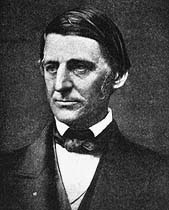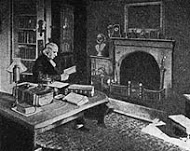New England Transcendentalism
by Leslie Perrin Wilson
Curator of William Munroe Special Collections at the Concord Free Public Library, Concord, Massachusetts
 Ralph Waldo Emerson (left) was the central and most influential figure among the group of radical thinkers and writers of the 1830s-1850s known as the New England Transcendentalists. His Nature, issued anonymously in 1836 (the year after he settled permanently on the Cambridge Turnpike in Concord), was a systematic exposition of Transcendental philosophy. Its publication marked the beginning of a period of intense intellectual ferment and literary activity by Emerson and the small, loosely associated group of other writers who comprised the movement.
Ralph Waldo Emerson (left) was the central and most influential figure among the group of radical thinkers and writers of the 1830s-1850s known as the New England Transcendentalists. His Nature, issued anonymously in 1836 (the year after he settled permanently on the Cambridge Turnpike in Concord), was a systematic exposition of Transcendental philosophy. Its publication marked the beginning of a period of intense intellectual ferment and literary activity by Emerson and the small, loosely associated group of other writers who comprised the movement.
Emanating from Boston and Cambridge and, because of Emerson's presence, from Concord, Transcendentalism also found expression through the writings of Amos Bronson Alcott (photo below), Orestes Brownson, William Henry Channing, James Freeman Clarke, Christopher Pearse Cranch, Margaret Fuller, William Henry Furness, Frederic Henry Hedge, Theodore Parker, Elizabeth Palmer Peabody, George Ripley, Henry David Thoreau, Jones Very, and others.
At the beginning of Nature, Emerson posed the question, "The foregoing generations beheld God and nature face to face; we—, through their eyes. Why should not we also enjoy an original relation to the universe?" The importance he placed upon a direct relationship with God and nature derived from the concept of the Over-Soul, described by Emerson in his essay "The Over-Soul" as "that great nature in which we rest ... that Unity within which every man's particular being is contained and made one with all other." The presence of the divine spirit in both nature and the human soul made a direct understanding of God and an openness to the natural world avenues to self-understanding as well as to the perception of broader truth. Moreover, in each manifestation of God, man could discover in encapsulated form all universal laws at work. What was required for this perception was neither the received dogma of traditional systems of belief nor rational intellectual insight, but rather a more mystical human intuition capable of sensing truth and morality in the various tangible expressions of the divine, including human endeavor.
The Transcendental emphasis on the oneness of individual souls with nature and with God gave dignity and importance to human activity and made possible a belief in the power to effect social change in harmony with God's purposes.
The humanistic focus of Transcendentalism arose partly as a reaction against the increasing dehumanization and materialism engendered by the Industrial Revolution in the early 19th century. It was also a response to what Emerson and his educated contemporaries felt to be the spiritual inadequacy of established religion.
In his radical "An Address, Delivered Before the Senior Class in Divinity College, Cambridge, Sunday Evening, July 15, 1838" (known as the "Divinity School Address"), Emerson queried: "In how many churches, by how many prophets, tell me, is man made sensible that he is an infinite Soul; that the earth and heavens are passing into his mind; that he is drinking forever the soul of God? Where now sounds the persuasion, that by its very melody imparadises my heart, and so affirms its own origin in heaven? ... But now the priest's Sabbath has lost the splendor of nature; it is unlovely; we are glad when it is done; we can make, we do make, even sitting in our pews, a far better, holier, sweeter for ourselves." .is was powerful, controversial criticism. It drew strong negative reaction, particularly from Harvard professor Andrews Norton.
Certain early Unitarian clergymen, chief among them William Ellery Channing (1780-1842; uncle of Concord poet William Ellery Channing), had turned away from unforgiving Congregational Calvinism and preached a more humanistic, emotionally expressive, and socially conscious form of religion, paving the way for the Transcendentalists' view of God. But even the liberal Unitarians remained under the influence of English philosopher John Locke (1632-1704), who had explained knowledge as perceivable only by direct observation through the physical senses.
Transcendental philosophy, on the other hand, was based on the premise that truth is innate in all of creation and that knowledge of it is intuitive rather than rational. The Transcendentalists found support for their idea of intuitive thought in the writings of German philosopher Immanuel Kant (1724-1804). The term "Transcendental," in fact, came from the Critique of Practical Reason (1788), in which Kant declared, "I call all knowledge transcendental which is concerned, not with objects, but with our mode of knowing objects so far as this is possible a priori" (that is, independent of experience).
 The Transcendentalists avidly read a variety of foreign philosophers and writers who provided affirmation of their concept of the divine and of man's relation to God. Among the many were: the Germans Fichte, Schleiermacher, Hegel, Schelling, Goethe, and Novalis; the English writers Coleridge, Carlyle, and Wordsworth, whose writings reflected a first-hand understanding of German thought; Plato and English neo-Platonic writers; Swedish mystic Emanuel Swedenborg; and the Eastern writings of Confucius and the sacred texts of the Vishnu Purana, the Upan.hads, and the Bhagavadgita. In 1840, Elizabeth Palmer Peabody (one of the publishers of the Transcendental periodical The Dial, issued from 1840 to 1844) opened a circulating library and bookstore on West Street in Boston to supply her comrades with hitherto difficult to obtain foreign works.
The Transcendentalists avidly read a variety of foreign philosophers and writers who provided affirmation of their concept of the divine and of man's relation to God. Among the many were: the Germans Fichte, Schleiermacher, Hegel, Schelling, Goethe, and Novalis; the English writers Coleridge, Carlyle, and Wordsworth, whose writings reflected a first-hand understanding of German thought; Plato and English neo-Platonic writers; Swedish mystic Emanuel Swedenborg; and the Eastern writings of Confucius and the sacred texts of the Vishnu Purana, the Upan.hads, and the Bhagavadgita. In 1840, Elizabeth Palmer Peabody (one of the publishers of the Transcendental periodical The Dial, issued from 1840 to 1844) opened a circulating library and bookstore on West Street in Boston to supply her comrades with hitherto difficult to obtain foreign works.
In addition to writing, the Transcendentalists expressed their idealistic philosophy through lecturing, through the Socratic dialogue format, and through a broad range of social reform activities.
Bronson Alcott's teaching technique at his Temple School in Boston in the mid-1830s and Margaret Fuller's "Conversations" at Miss Peabody's West Street library and bookstore in the early 1840s resembled Socrates' question and answer method of seeking philosophical understanding, as presented in the dialogues of Plato. The leader of the conversation—Alcott or Fuller—played the role of Socrates, asking the group of participants questions on a designated philosophical, literary, aesthetic, or religious topic and giving direction to the course of the discussion. This interactive process was consistent with the Transcendentalists' faith in intuition as a means of arriving at universal truth.
Alcott and Elizabeth Peabody worked toward educational reform. (Alcott served as Concord's Superintendent of Schools from 1859 to 1865, and in that capacity was given the opportunity to apply his theoretical optimism to a practical situation.) Thoreau and (more hesitantly) Emerson were galvanizing speakers and writers on behalf of the antislavery movement. Feminist Margaret Fuller used her pen to point out injustice in the circumstances of women's lives. Leaders of the movement established and populated two experimental utopian communities, Alcott's Fruitlands in Harvard, Massachusetts, and the larger, longer-lived Brook Farm in West Roxbury. Late in life, well past the peak of Transcendental activity, the enduring Elizabeth Peabody lent her support to the causes of woman's suffrage and world peace.
Thoreau's sojourn at Walden Pond from 1845 to 1847 was a deliberate and sustained attempt to test philosophical idealism in the concrete world. His Walden, or, Life in the Woods was published in 1854. In the chapter "Where I Lived, and What I Lived For," Thoreau wrote, "Men esteem truth remote, in the outskirts of the system, behind the farthest star ... In eternity there is indeed something true and sublime. But all these times and places and occasions are now and here. God himself culminates in the present moment ... And we are enabled to apprehend at all what is sublime and noble only by the perpetual instilling and drenching of the reality that surrounds us." By living intimately with nature at Walden, Thoreau attained to higher truth.
By 1860, the frenzy of energy and experimentation that had gripped the Transcendentalists in the 1830s and 1840s had passed, as had the bitter controversy that their pronouncements had sometimes provoked. Industrialization continued. Inequities were righted one by one, slowly, rather than through sweeping social change. The lasting influence of the Transcendentalists rests in the endurance of the major writings produced by the movement as American classics, worth reading in any period, and in the powerful inspiration that their reform efforts provided to later social movements, notably the impetus given to the Mahatma Gandhi and to the American civil rights movement of the 1960s by Thoreau's principle of non-violent resistance to oppressive civil government.![]()
ublished in 1854. In the chapter "Where I Lived, and What I Lived For," Thoreau wrote, "Men esteem truth remote, in the outskirts of the system, behind the farthest star ... In eternity there is indeed something true and sublime. But all these times and places and occasions are now and here. God himself culminates in the present moment ... And we are enabled to apprehend at all what is sublime and noble only by the perpetual instilling and drenching of the reality that surrounds us." By living intimately with nature at Walden, Thoreau attained to higher truth. By 1860, the frenzy of energy and experimentation that had gripped the Transcendentalists in the 1830s and 1840s had passed, as had the bitter controversy that their pronouncements had sometimes provoked. Industrialization continued. Inequities were righted one by one, slowly, rather than through sweeping social change. The lasting influence of the Transcendentalists rests in the endurance of the major writings produced by the movement as American classics, worth reading in any period, and in the powerful inspiration that their reform efforts provided to later social movements, notably the impetus given to the Mahatma Gandhi and to the American civil rights movement of the 1960s by Thoreau's principle of non-violent resistance to oppressive civil government.
Article originally appeared in the Concord Magazine, by Hometown Websmith, Concord, Mass., November 1998.
©2015. William Munroe Special Collections, Concord Free Public Library, Concord, Massachusetts.